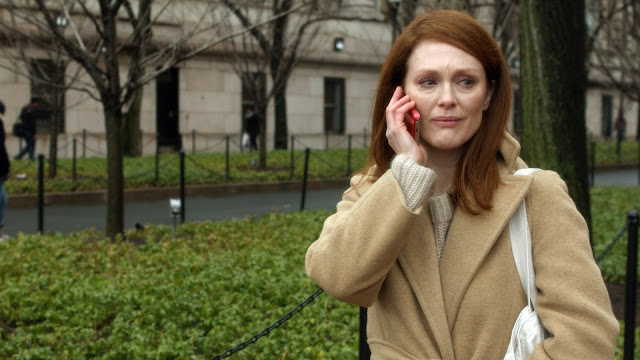“The
Hundred-Foot Journey” is largely a movie about food. It tries to romanticize
the kitchen but sadly can’t quite get the audience to get emotional over their
dinner like “Ratatouille” or “Babette’s Feast” can. The story of an Indian family opening a restaurant across the street from the French restaurant owned by Madame Mallory - a very, well, chauvinistic French chef stuck in her Frenchiness - tells of intertwining culture and overcoming bias. It is as familiar as it is stereotypical. A re-told story, however, rarely means a bad movie for me. A re-told story with one-note characters and boring, surface-y conflict does.
Helen
Mirren and Om Puri are the veteran actors of the ensemble and also the most
enjoyable thing to watch on-screen. The casting choice for Madame Mallory is
interesting, of course, in that Mirren is not actually French. The weight of Mallory’s
domineering character, however, would not have been the same were a
lesser-known French actress cast in her stead. Mirren established herself as a
regal presence worthy of respect in her Oscar-winning portrayal of Queen
Elizabeth in “The Queen.” In “The Hundred-Foot Journey” Papa Kadam even
addresses her at one point by saying, “You sit up there like a queen” to point
out her self-satisfied, controlling, and entitled demeanor. To help establish
Madame Mallory’s character as the standoffish and insensitive neighbor to the
Kadam family, the choice to cast Helen Mirren – a well-established, automatic
attention-grabbing actress, as well as offering a stark contrast to Puri – was
only appropriate.
Likewise, the choice to cast Om Puri was well
suited (though perhaps more obvious due to being an Indian actor). He has a great ability to play off the
characters around him – particularly Madame Mallory. In one scene, when Madame Mallory grows
upset at the loud Indian music, Puri nonchalantly tosses the tablecloth and
calmly thanks her for barging into their home. In response to her condescending
behavior, he promptly turns the music back up and starts dancing joyfully. This
shows pride in his culture and feisty defiance to mistreatment. Their early
scenes show the cultural difference with amusing conflict, but unfortunately these scenes are few.
These two
performances are great and show an interesting side to the convergence and celebration of culture in the way I wish the food or the story had been able to. I'm sure this theme could have been better illustrated were these two talented actors given
more time to interact and carry the story instead of allowing the younger actors
and struggling plot filled with clichés to dominate. Manish Dayal plays Papa Kadam's son - the cooking prodigy who goes on to advance his career in other fancy Frenchy restaurants - and Charlotte le Bon plays the sous-chef of Madame Mallory's restaurant. The attempts at a romantic side-story seem half-hearted and unbelievable and both characters seem devoid of passion. It seems the son, Hassan, is the protagonist, but his character is underdeveloped and without much dramatic arc. I was left unsatisfied.
It's a tale as old as time where you know the end as soon as the beginning ensues. But "The Hundred-Foot Journey" brings nothing new to an old story. Any element with potential to enthrall is thrown in with laziness: the humor is brief and mediocre; the story takes no risks. Each actor's talent seems wasted and each potential conflict comes without tension. Of course, mediocre feel-good movies have their place. Nothing particular, though, stands out enough to make me remember it or desire to watch it again.
Ultimately, everything about the movie felt hollow. With Lasse Hallström as director, I expected "Chocolat" 2.0 and with Oprah as an executive producer, I expected something sentimental with a high probability of soap and cheese. I will admit, the time spent watching wasn't unpleasant. I just hoped that a movie with any kind of food subtext would leave me craving and hungry rather than checking my watch. 4/10
It's a tale as old as time where you know the end as soon as the beginning ensues. But "The Hundred-Foot Journey" brings nothing new to an old story. Any element with potential to enthrall is thrown in with laziness: the humor is brief and mediocre; the story takes no risks. Each actor's talent seems wasted and each potential conflict comes without tension. Of course, mediocre feel-good movies have their place. Nothing particular, though, stands out enough to make me remember it or desire to watch it again.
Ultimately, everything about the movie felt hollow. With Lasse Hallström as director, I expected "Chocolat" 2.0 and with Oprah as an executive producer, I expected something sentimental with a high probability of soap and cheese. I will admit, the time spent watching wasn't unpleasant. I just hoped that a movie with any kind of food subtext would leave me craving and hungry rather than checking my watch. 4/10

































